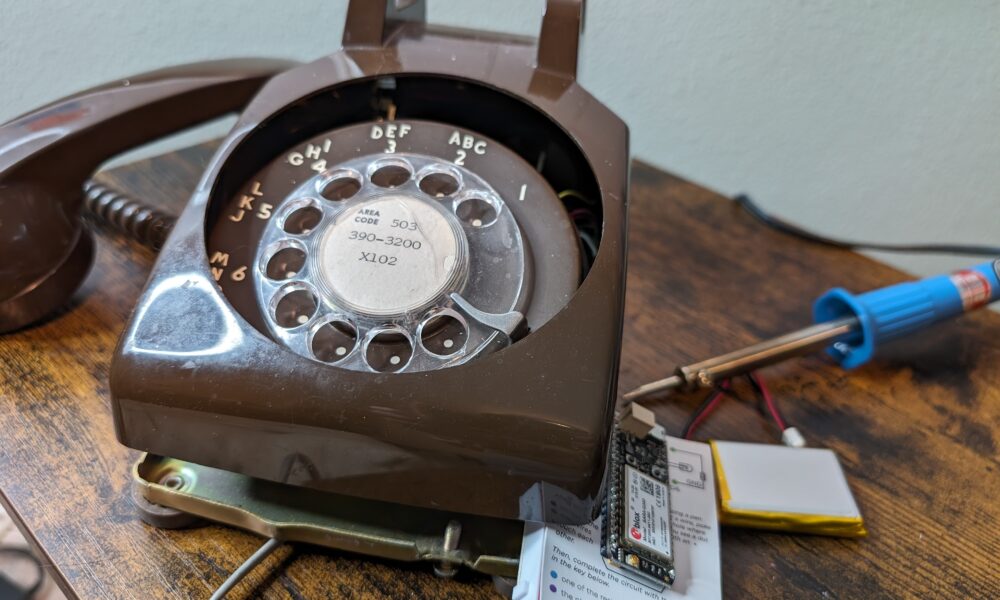Try, try and try again, and eventually you might win – in the Oregon Legislature.
That was the case Monday for Sen. Janeen Sollman, D-Hillsboro, who has tried since 2021 to get the Legislature to pass a “right to repair” bill giving individuals more options to fix their own electronic gear. In a final vote, her Senate Bill 1596 passed the House with a bipartisan 42-13 vote about a week after it passed the Senate, 25-5. It now heads to Gov. Tina Kotek for her signature.
Sollman, who was listening to the discussion and watching the vote, threw her arms up afterward and declared “I’m floating” as she strolled out of the chamber.
She told the Capital Chronicle in a call that she was “super proud” of the bill and everyone who contributed to it.
“It’s been quite a journey. But I have to say, this is a village movement. Oregonians really firmly believe that they own something they should have the right to repair. And that’s what we stayed focused on in this policy,” Sollman said.
The bill would require manufacturers to offer any necessary documentation, parts, tools or any device needed to repair electronic equipment at a “fair cost” and on “reasonable” terms. Those tools would allow consumers to fix their gear themselves or go to independent repair shops rather than being forced to go to the manufacturer or an authorized facility, potentially paying more. The bill also would ban the practice of companies disabling devices or voiding warranties for devices fixed without authorized parts. It would apply to cell phones made in 2021 and after and to other products dating to 2015.
Rep. Courtney Neron, D-Wilsonville, who presented the bill to House members, said it would be good for the environment, schools, local businesses and seniors.
“This bill will increase affordable options to repair devices and provide options for consumers who cannot easily buy a new phone, tablet or laptop.”
She said it would save money and reduce emissions and electronic waste, noting that Oregonians toss nearly 5,000 phones every day.
“If every Oregonian extended the life of their phones just one year, it would be the equivalent of removing 8,100 cars off the road,” Neron said.
The bill drew bipartisan support, with House Democrats voting in favor along with several Republicans, including Rep. Kevin Mannix, R-Salem, who said it reflected Oregonians’ attitude toward fixing their own equipment.
“This bill cannot totally prevent the attempts to misuse electronic devices. Those attempts will continue, but it provides a comprehensive approach to doing the best possible job of protecting against those improper uses,” Mannix said.
Republican opposition
All of the representatives who voted against it are Republicans. Rep. Virgle Osborne, R-Roseburg, commended Sollman for her work on the bill and said he would like to vote for it, but that it would pose a security risk and would be litigated in the courts.
“There will be a huge lawsuit,” Osborne.
If signed by Kotek, the bill will go into effect on Jan. 1. Civil enforcement by the attorney general’s office would start July 1, 2027, with violators potentially fined $1,000 a day.
Supporters say the bill would be especially good for marginalized communities that are often left on the sidelines in the digital world. A 2021 report by the Federal Trade Commission to Congress said consumer products are becoming increasingly harder to fix and maintain and that communities of color are heavily affected.
If enacted, the bill will make Oregon the fourth state nationwide to adopt a technology right to repair law after Minnesota, New York and California. Massachusetts has approved a right to repair law on vehicles and Colorado has adopted one for wheelchairs and another for farmers.
The Oregon bill was modeled after the one in California, which is going into effect in July. It was crafted with input from advocates, manufacturers and business organizations, and Google and the Technology Association of Oregon, which represents small and international technology companies, support the bill.
It is also backed by about 100 small repair shops across the state along with recycling nonprofits, the Oregon Citizens’ Utility Board, Metro and the League of Oregon Cities. Intel, Amazon, Amazon Web Services, Microsoft and Oregon Business & Industry, the state’s largest business group, are neutral.
Apple, however, is against the bill. During an earlier Senate hearing, John Perry, a senior security manager at Apple, said the company opposes a provision against “parts pairing” that gives Apple control of certain parts.
“It is our belief that the bill’s current language around parts pairing will undermine the security, safety and privacy of Oregonians by forcing device manufacturers to allow the use of parts of unknown origin and consumer devices,” he said.
Parts pairing, a relatively new practice, requires consumers or independent repair experts to purchase many parts from Apple and then have them validated by the company. Unauthorized parts can trigger warnings, even if the device works fine.
Experts say most major repairs on Apple devices require jumping through these hoops. Lawmakers struggled with the idea, with several questioning Perry, who insisted the practice aims to protect private data and the consumer’s security.
Neron, citing a letter from the Federal Trade Commission, said the parts pairing hurts consumers.
“Obstacles to repair like parts pairing drive up the price that consumers must pay to fix a device and cause consumers to purchase a new device before the end of its useful life,” she said, reading an excerpt from the letter. “Manufacturer repair restrictions also make it more challenging for small repair businesses to compete and contribute to unnecessary e-waste.”
This story originally appeared in the Oregon Capital Chronicle and is republished here under a CC BY-NC-ND 4.0 license. Read more stories at oregoncapitalchronicle.com.






